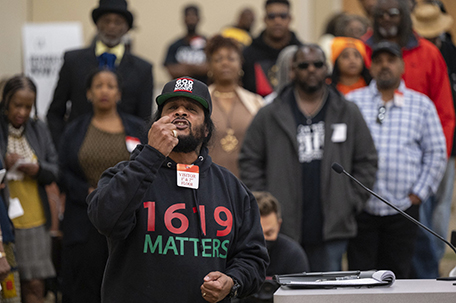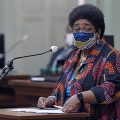
ABOVE PHOTO: Reggie Roman, of Los Angeles, speaks during the public comment portion of the Reparations Task Force meeting in Sacramento, Calif., on Friday, March 3, 2023. California’s statewide task force on Black American reparations continues to delve into key questions on eligibility and what form reparations may take. (Paul Kitagaki Jr./The Sacramento Bee via AP)
By Sophie Austin
ASSOCIATED PRESS
SACRAMENTO, Calif. — Nearly two years into the California reparations task force’s work, the group still has yet to make key decisions that will be at the heart of its final report recommending how the state should apologize and compensate Black residents for the harms caused by slavery and discrimination.
A vote possibly slated last weekend on requirements for who would be eligible for payments and other remedies was delayed because of the absence of one of the committee’s nine members.
After two hours of intense debate, the task force voted unanimously last Saturday in favor of an agency that would provide certain services to descendants of Black enslaved people while overseeing groups that provide other services.
The vote followed one proposed by task force member Cheryl Grills at a prior meeting to recommend that this entity mainly serve as an oversight body.
Task force Chair Kamilah Moore said last Saturday’s vote was necessary to take into account input from residents who gave public comments in favor of an agency with the power to provide services.
“It’s not enough for us as nine esteemed colleagues to determine what repair looks like,” Moore said. “We have to listen to the descended community.”
Lawmakers passed legislation in 2020 creating the task force to assess how the legacy of slavery harmed African Americans long after its abolition through education, criminal justice and other disparities.
The legislation directs the task force to study reparations proposals “with a special consideration for” the descendants of enslaved Black people living in California and is not meant to create a program in lieu of one from the federal government.
The work of the task force has captured widespread attention, a result of being the first of its kind in the country. But some used the group’s latest two-day meeting in Sacramento to warn that not enough Black Californians are sufficiently informed about its work.
One resident said the task force’s groundbreaking interim 500-page report, released last year, should be made available in libraries and schools, a topic the group discussed last Saturday. But others said it’s not just up to the task force and its communications team to get the word out on their work.
“This room should be filled with media, and it’s not because Black people are a pariah,” Los Angeles lawyer Cheryce Cryer said last Saturday. “We are at the bottom of the totem pole.”
The two-day gathering in Sacramento, the state’s capital, comes as the group approaches its July 1 deadline to release a report for lawmakers.
The document will represent a milestone in a growing push for reparations efforts in different parts of the country. It is a movement that has garnered support from a large share of African Americans, but also advocates that include Japanese Americans who fought for families to receive payments from the federal government after residents were placed in internment camps during World War II.
Sacramento resident Tariq Alami, who has been following along with the task force’s work since its early stages, said it is clear the government should have passed reparations for Black Americans a long time ago.
“It doesn’t take a genius to see that there are differences in the society as a result of what we have encountered as Black people,” Alami said.
Dozens of advocates and residents came from across the state to the California Environmental Protection Agency building to give public comments last Friday and Saturday that ranged from detailing family histories of having property seized from ancestors to calling on federal lawmakers to follow California’s lead.
After the task force releases its final report, the fate of its recommendations would then lie with state legislators, two of whom are members of the task force — Assemblymember Reggie Jones-Sawyer and state Sen. Steven Bradford, both Democrats representing parts of Los Angeles County.
Lawmakers would also decide where funding for any reparations legislation may come from.
The task force has spent multiple meetings discussing what time frames reparations could hinge on for five harms economists pursued estimates for to help quantify the extent of discriminatory policies against Black Californians.
Those economists said last Friday that some of the data and information they would need to come up with additional estimates for the impact of harms include figures on the gap between what the government paid Black residents for property it seized and the actual value of that property.
The task force previously proposed the following time frames for the five harms, which begin either when the state was founded or when certain discriminatory policies were implemented: 1933 to 1977 for housing discrimination and homelessness, 1970 to 2020 for over-policing and mass incarceration, 1850 to 2020 for unjust property takings, 1900 to 2020 for health harms, and 1850 to 2020 for devaluation of Black-owned businesses.
Task force member Monica Montgomery Steppe voiced concerns last Friday about making 1977 the cutoff year for housing discrimination and homelessness, given that Black residents make up about a third of Californians experiencing homelessness.
That year was proposed based on the passage of the Community Reinvestment Act, a federal law spurring lending in low- and middle-income neighborhoods.
The economists said using that year helps back up their estimates for the effects of government-sponsored redlining when majority-Black neighborhoods were often categorized as “hazardous.”
“There are additional reasons why people are sleeping on the street,” Steppe said.
The task force voted last year to limit reparations to descendants of enslaved or free Black people living in the United States as of the 19th century.
Members have not yet voted on whether compensation should be limited further to California residents or also include people who lived in the state and intended to stay but were displaced.
Elsewhere in the country, reparations proposals for African Americans have had varying results.
A bill that would allow the federal government to study reparations hasn’t come close to a vote in Congress since it was first introduced in 1989.

















Leave a Comment